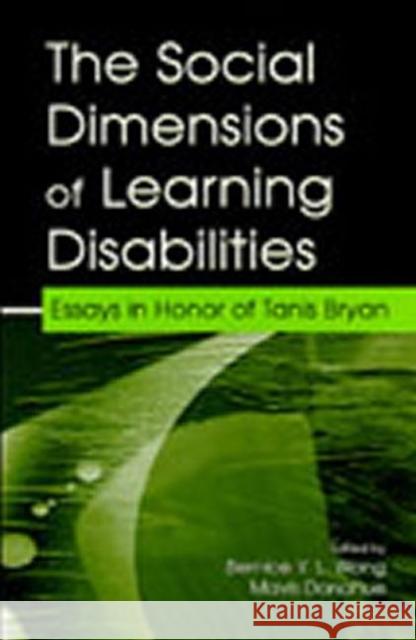The Social Dimensions of Learning Disabilities: Essays in Honor of Tanis Bryan » książka
The Social Dimensions of Learning Disabilities: Essays in Honor of Tanis Bryan
ISBN-13: 9780805839180 / Angielski / Twarda / 2002 / 252 str.
The Social Dimensions of Learning Disabilities: Essays in Honor of Tanis Bryan
ISBN-13: 9780805839180 / Angielski / Twarda / 2002 / 252 str.
(netto: 676,35 VAT: 5%)
Najniższa cena z 30 dni: 654,86
ok. 16-18 dni roboczych.
Darmowa dostawa!
Thirteen chapters summarize research on the social dimensions of learning disabilities. The contributions are presented by Wong (Simon Fraser U.) and Donahue (U. of Illinois at Chicago) and dedicated to the researcher who first declared, in 1976, that social status should be considered part of the
Bringing together over 25 years of research into the social aspects of learning disabilities (LD), this book presents a range of topics that reflect on the richness of research interests in the discipline. In honor of Tanis Bryan, the pioneer in research on social competence of children with LD, the researchers that follow her lead systematically examine critical issues in the social relationships of these children. The book begins by placing the work of Bryan and her research associates' in context, in terms of the prevailing theoretical frameworks and social political influences that led to the enormous impact of the work. The chapters that follow discuss:
*social cognition in children and adolescents with LD;
*self-understanding and self-esteem in children and adults with LD;
*the lonely plight, peer influence, and friendship patterns of children with LD;
*parental understanding and how this understanding shapes their scaffolding of learning in their children with language disabilities;
*a new intervention approach toward enhancing self-concept and reading comprehension in LD students through bibliotherapy;
*important and timely information on interventions for enhancing peer relations and preventing drop-out in adolescents;
*models in longitudinal research with implications for research on social dimensions of LD; and
*the important role of teachers in enhancing classroom social experiences for students with LD.
Summarizing research findings and their implications in the various areas in the field, this book will be an excellent text for a special topics course in graduate programs in learning disabilities, special education, psychology, and social work. In addition, it will be a highly important resource for university/college teachers, researchers, graduate and honors students, and professionals in learning disabilities, social psychology, and social work.











